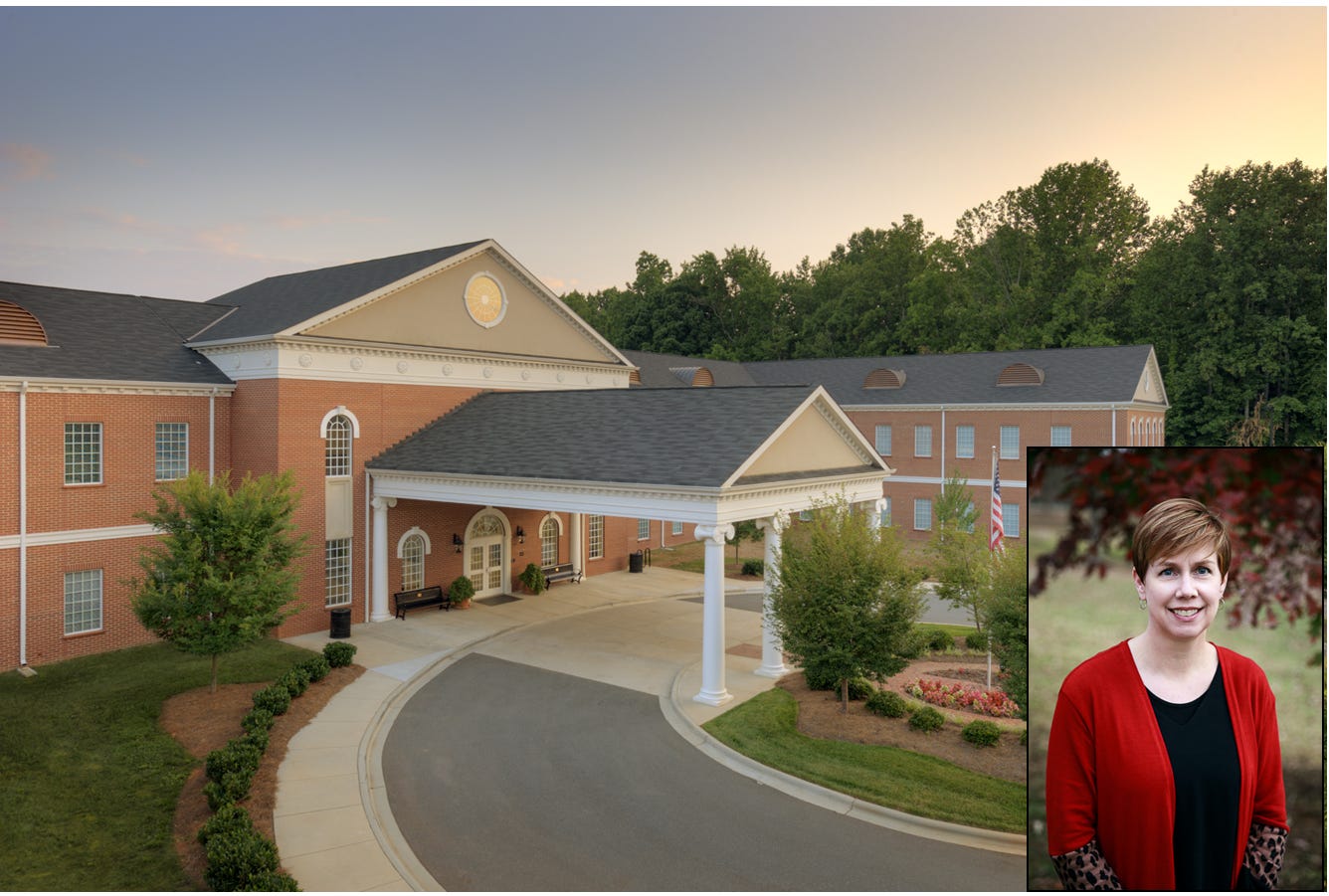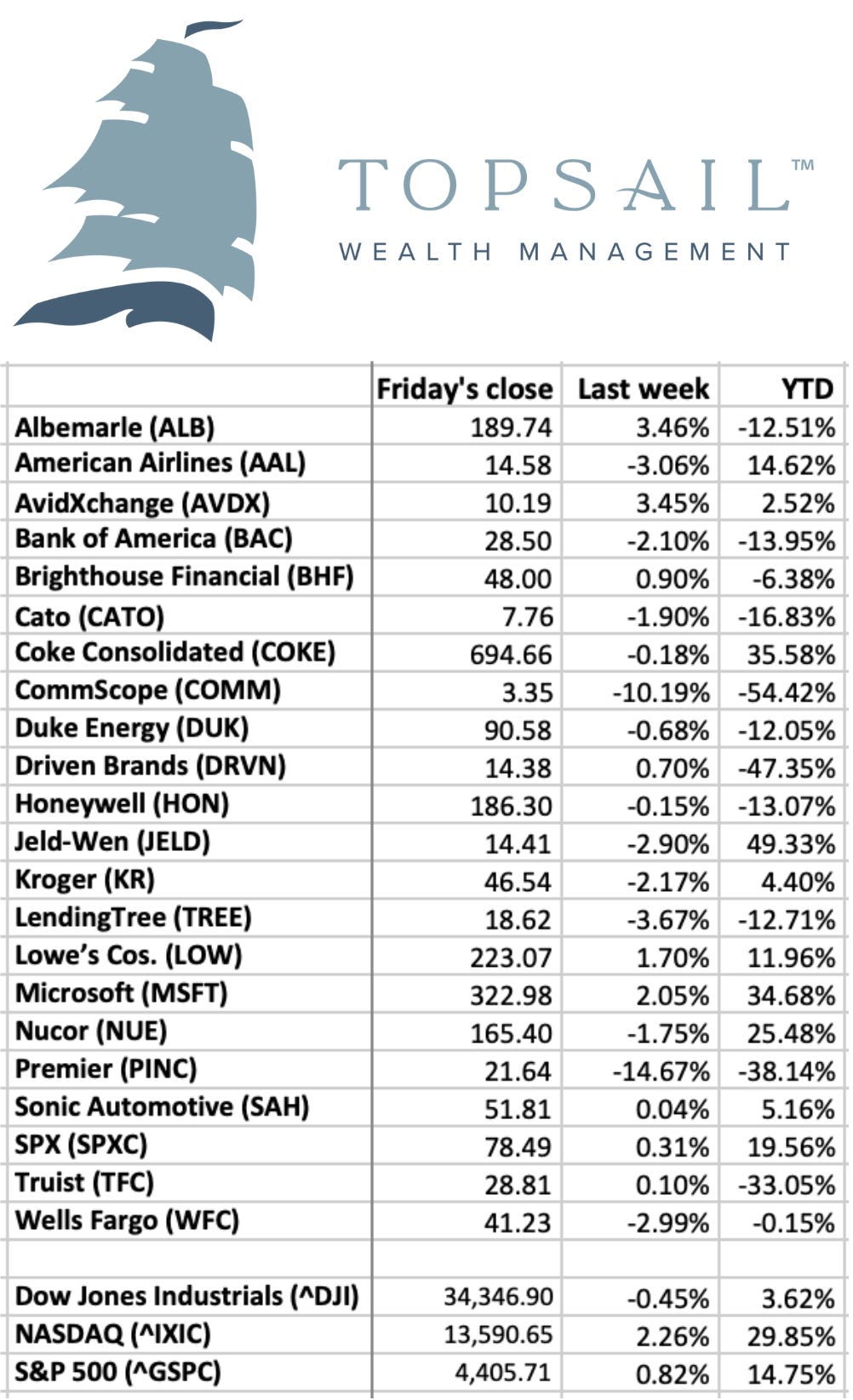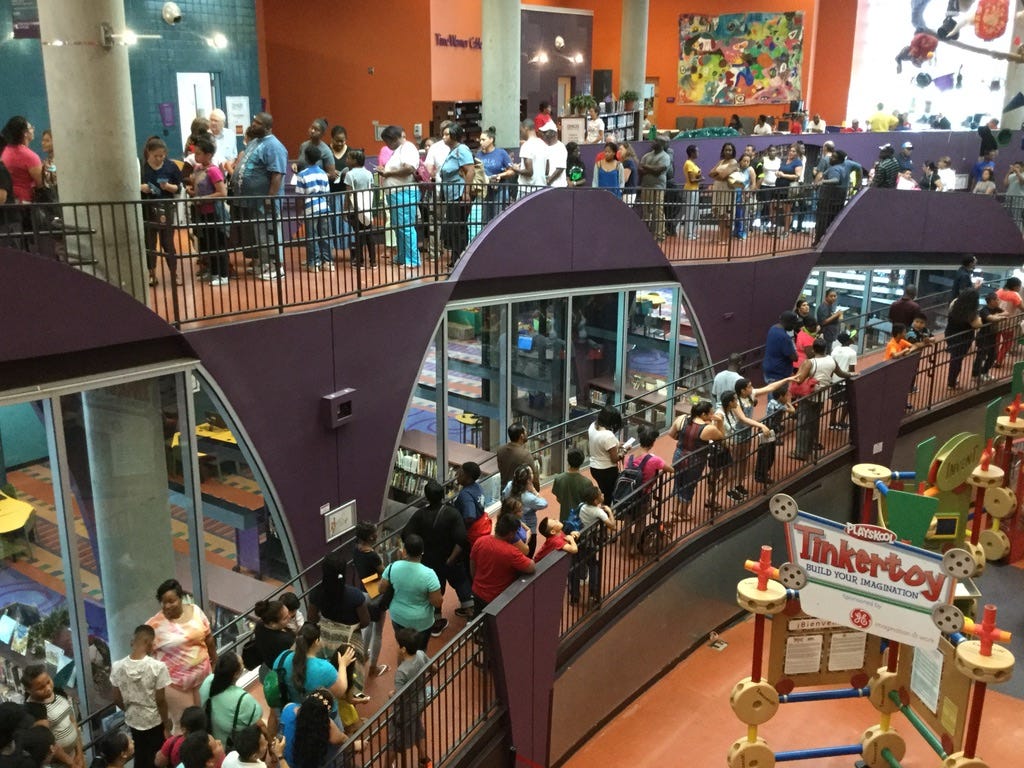A greater awareness of learning disabilities
Plus: Mint Hill is getting a brewery; Listings of local stocks; Free laptops handed out at ImaginOn; Close vote ahead on Eastland; CATS backtracks on Greyhound station; Arrests in home break-ins
Good morning! Today is Monday, August 28, 2023. You’re reading The Charlotte Ledger, an e-newsletter with local business-y news and insights for Charlotte, N.C.
Need to subscribe — or upgrade your Ledger e-newsletter subscription? Details here.
Today's Charlotte Ledger is sponsored by T.R. Lawing Realty:
Q&A: Inquiries and enrollment have increased since the pandemic at The Fletcher School, a private school for students with learning disabilities
The Fletcher School on Sardis Road in south Charlotte serves students in grades K-12 who have a diagnosed learning disability. Tara Terry has been the head of the school for just over a year. (Photos courtesy of The Fletcher School)
by Cristina Bolling
For families with a child struggling to learn, it can be a long road between realizing there’s a problem and figuring out the best way to take action.
For some students, having schools closed during the pandemic slowed down their diagnoses of dyslexia, dysgraphia (writing difficulties) and other learning disabilities. But for others, schooling at home during the pandemic gave parents more of a glimpse into their child’s challenges and spurred them to take action.
Tara Terry, head of school at The Fletcher School, and her staff have seen all of that firsthand. The phones have been busy at the south Charlotte private school for students with learning disabilities during the last four years, as parents have sought schooling alternatives, or sometimes just counsel, for their children.
Enrollment at The Fletcher School is up at about 10% since the pandemic, Terry said, and its 288 K-12 students started back last week. Tuition at Fletcher costs $27,600 for students in grades K-5 and $29,100 for grades 6-12. Families can apply for state grants and need-based scholarships to help cover the cost and can spread payments out, Terry said.
Terry has been the head of the 41-year-old Fletcher School since July 2022. She was previously assistant head of school for academics at The Howard School in Atlanta, which is an independent K-12 school serving 350 students with language-based learning differences.
Recently, she sat down with The Ledger to talk about what’s new in the world of education for kids with learning differences, how public perception of disabilities like dyslexia have changed, and how Fletcher approaches teaching its students.
The conversation was edited for clarity and brevity.
Q: How did having kids learning from home during the pandemic change how parents were able to know that their children needed help?
They recognized that their children were struggling sooner than they would have if they hadn’t seen it happen in action. One parent said she saw her son struggling and kept asking the teacher and the teacher was like, “This is developmental. This is developmental.” And she said, “But I can see the other kids, too — he wasn’t able to do it.”
She said, “We got him tested a lot earlier than we would have, we found Fletcher a lot earlier than we would have.”
Q: It seems like “learning disabilities” can mean a lot of things. What specific criteria do students at Fletcher need to meet to be admitted?
For students who are in second through fifth grade, you have to have a diagnosis of a specific learning disability. Typically, our students are diagnosed with dyslexia, but we also serve students who have written expression disabilities, math disabilities. You can also have a diagnosis of ADHD, but it can’t be your primary diagnosis.
Beginning in sixth through 12th grade, you can have a primary diagnosis of ADHD, but it has to be impacting your schoolwork. So a student who’s making all A’s but is a little bit stressed because of their ADHD is not well-served here — you just don't need our level of support. Most of our students in sixth through 12th grade are also diagnosed with a specific learning disability, often dyslexia. In kindergarten and first grade, we don’t require a diagnosis. But what we do look for — and the reason for that it’s very difficult to diagnose that early — is that they haven’t had a lot of school. You just don’t know yet.
We do not serve kids on the autism spectrum, but we get a lot of inquiries about that. Our admissions department is great about referring to schools that would be appropriate, based on the profile.
Q: When are parents most likely to seek help for a child who might not be learning at the same level as their peers?
We get a ton of inquiries in third, fourth, fifth grades, because parents have waited a long time to recognize just how far behind students are. That’s also the time those standardized tests start coming out.
Also, a lot of our parents are able to see what is going on in preschool, kindergarten, first grade, and go ahead and make a move earlier. And we know early intervention is better. It’s helpful for us to get students when they’re just learning to read.
Q: Is Fletcher usually a first stop for parents? Or do you find that families have taken a bunch of twists and turns to get here?
About half of our families come from independent (private) schools and about half from public schools. We often get families who come from independent schools as referrals, because the independent schools know us. The public schools can’t refer to us, because then they would have to pay for us, and so they’re not allowed to do that.
When students get tested privately by a private psychologist, those professionals know us, too, and they’ll often refer children to us and families to us. And then sometimes families just start to Google “learning differences, learning disabilities, dyslexia,” and they end up here with us. We get a lot of inquiries — a lot of online inquiries and a lot of phone calls.
Q: Have things changed in how society views learning disabilities? Do you think the pandemic has maybe had a role in changes in perception?
I think the pandemic certainly raised awareness of how difficult it is to learn in these giant classrooms, and I think that parents got to really see that firsthand. Like I said earlier, they got to see their kids struggling earlier.
I also think there’s just less stigma associated with having a diagnosis of dyslexia. It doesn’t mean a single thing about your intelligence. In fact, most of our kids are really smart, because you have to be to get around the things that are hard for you. I think that people are beginning to see that having accommodations doesn’t mean anything — it just means you have an accommodation.
When parents come here, and they walk in the building and they see what it looks like, we are a happy place full of 280-something really happy kids. And so, there’s also the sort of, “Oh, this is just school.” You go to math class, and you go to reading class, and you go to art, and you go to lunch, and you have PE, and you go to after(-school) care. It looks like every other school. And I think that helps parents. OK, this diagnosis is one tiny piece of my child’s life. It’s a really important piece that we need to deal with, but it’s not their entire existence.
Today’s supporting sponsor is Catapult, formerly The Employers Association, which presents the 2023 HR Leadership Series. Our fall events empower you to attract and retain top talent with compelling total rewards and professional development. Register now.
Now even Mint Hill is getting a brewery; ‘relaxed Caribbean vibe’ in the suburbs
Breweries have been opening like gangbusters throughout Mecklenburg County in recent years, and now one is even on the verge of opening in Mint Hill.
Panzú Brewery plans to open next month and has all its ABC and health inspection permits, co-owner Rosa Marte tells The Ledger. She says she sensed a void in the town of 27,000 in southeastern Mecklenburg — and that townspeople who wanted to go to a brewery would have to choose between uptown Charlotte and Matthews.
“There was something missing here,” she says. “We didn’t want to compete with the brewers in uptown. That’s not going to work. We want to be the town’s brewery.”
After Panzú opens in mid-September, Davidson will be the only one of seven municipalities in Mecklenburg with no brewery. (Chop-chop, Davidson.)
Flavors of the Caribbean: Panzú’s backstory and plans are different than most of the county’s 40+ breweries. She and her brother are immigrants from the Dominican Republic, and they’re planning to sell beer as well as Caribbean small plates. An online menu lists goat empanadas, piña colada ceviche, plantains and jerk chicken wings, among other offerings. They’re shooting for a “relaxed Caribbean vibe.”
Before coming to the U.S., their family business in the Dominican Republic was in fruit pulp manufacturing. The brewery’s name, “Panzú,” comes from the nickname of their late father.
“’Panzú means ‘big beer belly guy’ in Dominican slang,” Marte explains. “My dad used to love beer.”
The brewery/restaurant is shooting for a Sept. 15 opening. It’s on Matthews-Mint Hill Road near Mint Hill’s downtown. —TM
➡️ Charlotte magazine took a look this month at the trend of breweries opening in the suburbs
Related Ledger article:
“A rough year for craft beer,” (🔒, June 5)
Taking Stock, sponsored by Topsail Wealth Management
Topsail Wealth Management partners with you to provide personalized advice. Minimizing costs and the complexities of your wealth and investing plan.
How local stocks of note fared last week (through Friday’s close), and year to date:
A long line for free laptops
The Charlotte nonprofit E2D - Eliminate the Digital Divide handed out 1,000 free laptop computers at the ImaginOn library on Saturday. The line started as early as 4 a.m. for the giveaway, which started at 9 a.m. The charity refurbishes laptops and distributes them to residents of low-income households to ensure that students and adults have access to essential technology. About 2,000 people were turned away. “N.C. and Mecklenburgers need to know that the need remains real and critical,” said E2D president Pat Millen. (Photo courtesy of E2D - Eliminate the Digital Divide)
In case you missed it: Some of The Ledger’s summer highlights
Summer break is over: Charlotte-Mecklenburg Schools cranks up classes today, and many private schools are in their second or third week.
Like many publications, we find that readership slows a little in the summer months. When people are on vacation, they tend to read emails less.
So today, we’re highlighting a few Ledger articles you might have missed:
Artificial intelligence series: In July, we took an up-close look at how Charlotte-area businesses are using artificial intelligence in our five-part “Faces of AI” series. We examined how it’s already affecting fields including marketing, banking and the tech sector — and where it’s going next.
Aldersgate financial troubles: We’ve been the only news outlet to report on the unfolding story about Aldersgate, which state insurance regulators placed under financial supervision this month after declaring the retirement community to be “insolvent or in imminent danger of becoming insolvent.” (We’ll keep following that story.)
Covid-related speech delays: We looked into the recent local surge in speech delays among young children, many of whom missed out on social interaction during Covid.
Office struggles: We have continued to examine the challenging problem of empty uptown office towers, and the ripple effects that is having throughout commercial real estate as employees continue to work hybrid schedules.
🎧 Podcasts: We continue to release our weekly Charlotte Ledger Podcast, with interviews with local leaders in business, nonprofits, education and other fields.
There’s a lot more, of course, which you can find on our website. And more to come this fall, including a couple in-depth series on important local topics.
The Ledger focuses on producing high-quality, original information, with interesting and important news and insights you can’t find anywhere else — and delivering it in an easy-to-read format free of pop-up ads, auto-play videos, pay-to-play marketing schemes and crazy clickbait.
We plan to keep it up to help keep you informed about the community we all live in (even if we’d all rather be on summer vacation…). Thanks for reading! —TM
🇺🇸 All the voting info you need: Early voting in Charlotte continues this week for the Sept. 12 Democratic primary, which is open to Democratic and Unaffiliated voters. Check out The Ledger's Election Hub, with short video interviews, and links to all the info you might need — including voter guides from different media and up-to-date news articles about the various races.
Happy voting!
You might be interested in these Charlotte events
Events submitted by readers to The Ledger’s events board:
WEDNESDAY: Full Moon Paddle, 8:30-10 p.m., 724 Elm Ave., Mount Holly. A perfect date night, evening out with friends or anyone looking for a memorable adventure! We provide everything you need on this guided kayak tour beneath the rising moon. Beginners welcome. Campfire plus s’mores and beverages afterward. Tickets are $55.
SEPT. 11: Regional Transportation Summit, 8:30 a.m. - 3 p.m., Ballantyne hotel. Come hear from federal, state and municipal leaders about one of the keys to economic development and quality of life in the Charlotte area: transportation and mobility. South Charlotte Partners once again brings together stakeholders to discuss the current status and future direction for transportation and mobility in the region. Tickets are $100.
◼️ Check out the full Ledger events board.
➡️ List your event on the Ledger events board.
In brief:
Nail-biter tonight on Eastland? There could be a close vote tonight on the future of the old Eastland Mall, with Charlotte City Council members appearing to be almost evenly split over two proposals: an indoor sports center and a tech hub/festival venue. Each would require about $30M in tax money. City staff and developer Crosland Southeast favor the tech hub proposal, while neighborhood groups favor the indoor sports proposal.
CATS backtracks on UCity Greyhound station: The Charlotte City Council was scheduled to vote today on a plan by the Charlotte Area Transit System to move the Greyhound bus station from uptown to University City for 5 years because of the construction of uptown’s Gateway Station project. But CATS is saying it will now re-evaluate locations for the bus station after a community outcry. Council member Renee Johnson, who represents the area, said in an email to colleagues that “the negative aspects that surround Greyhound stations will outweigh the positive.” (WSOC)
Arrests in south Charlotte break-ins: Charlotte-Mecklenburg Police say they have made several arrests in connection with a string of residential break-ins in south Charlotte in late 2022 and early 2023, including some that were “potentially coordinated by a South American crime group.” One of the suspects was arrested in Virginia and might be deported to face charges in a different country, CMPD said. (Charlotte-Mecklenburg Police)
Furniture maker closes: North Carolina furniture company Mitchell Gold + Bob Williams has abruptly ended its operations after more than 30 years, after saying it failed to get financing. It is based in Taylorsville and has an estimated 750 workers. (Business of Home)
Farewell to Fatz Cafe: Fatz Cafe, a chain with 18 locations in the Southeast, permanently closed all its restaurants last week. It was founded in 1988 and was known for its Calabash chicken and other comfort foods. In the Charlotte region, it had restaurants in Lincolnton, Shelby and Rock Hill. (Restaurant Business)
A commercial real estate story: The developer of Camp North End shared how he was able to buy the land to develop the mixed-use center. In a lengthy post on X (formerly Twitter), Damon Hemmerdinger of ATCO Properties wrote that the lessons are to “never give up,” “conduct yourself as if your reputation matters, because it does” and “hope for a seller who makes the kind of short-sighted mistakes as Rite Aid made.”
HOA gone wild: A Mecklenburg County woman won the first round of a court battle against her homeowners association at The Yachtsman on Lake Wylie, after it sought to fine her $12,000 and put liens on her townhouse over a debate over new windows. She said the HOA approved the windows initially but then changed its mind after they were installed. “If I didn’t have the money to fight them, they would have taken my house,” the 51-year-old single mother said. A lawyer for the HOA told a reporter looking into the case that he should stop trying to contact HOA board members. (Observer)
Need to sign up for this e-newsletter? We offer a free version, as well as paid memberships for full access to all 4 of our local newsletters:
➡️ Learn more about The Charlotte Ledger
The Charlotte Ledger is a locally owned media company that delivers smart and essential news through e-newsletters and on a website. We strive for fairness and accuracy and will correct all known errors. The content reflects the independent editorial judgment of The Charlotte Ledger. Any advertising, paid marketing, or sponsored content will be clearly labeled.
Like what we are doing? Feel free to forward this along and to tell a friend.
Sponsorship information/customer service: email support@cltledger.com.
Executive editor: Tony Mecia; Managing editor: Cristina Bolling; Staff writer: Lindsey Banks; Business manager: Brie Chrisman, BC Creative








